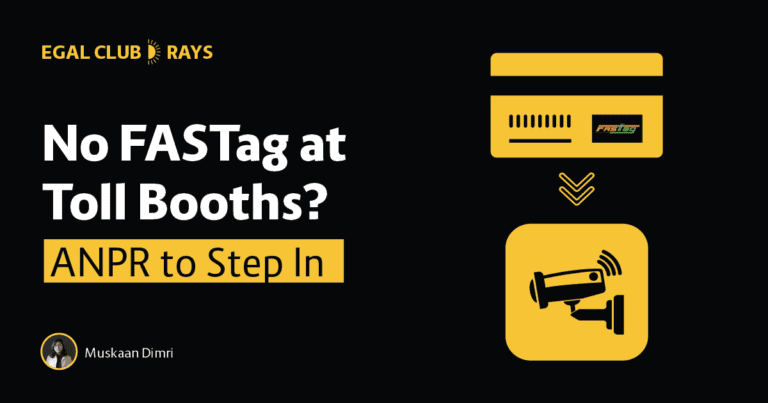A commercial driver faces many challenges in the day to day life, be it the harsh weather, the blistering heat or difficult customers to deal with. But the long queues in the toll plaza, cash payments, counting of change and giving back is a tedious task and a regular affair for the drivers.
According to a 2013 study conducted by the Transport Corporation of India (TCI) and IIM Kolkata, Rs. 60,000 crores a year is lost in toll booth robberies each year. Later, the National Highways Association of India (NHAI) proposed to the government digital alternatives to toll booth transactions. An alternative module is FASTag, which was eventually implemented to simplify and smooth the operation of toll booths.
What is FASTag?
FasTag is a radio frequency identification (RFID) device that comes as a rechargeable tag to ensure seamless movement of vehicles on highways. The device must first be registered with a Central Clearing House (CCH) operator and bank account. And you need to install it on the windshield of your vehicle. As your vehicle passes a toll booth, your sticker or tag is automatically scanned and the toll is immediately debited from your prepaid account linked to your tag. Around 550+ toll plaza have an operating FASTag system. But over the years many complaints have been received by users regarding the FASTag system, which has forced the government to work upon other methods of collecting tolls and scrapping the FASTag method.
Some demerits of the FASTag system are:
- Faulty RFID: RFID or radio frequency identification is a wireless system which helps in making payments directly. It comprises two parts – the reader and the software, sometimes there is a fault in the reader which renders the services for sometime and causes difficulty in the payment of toll.
- Server Issues: In outskirts of cities there may be issues in the servers which may lead to failure in the automated deduction or double deduction due to technical glitches.
- Blacklisting of Wallet: An account can get blacklisted if one does not have enough money in the FASTag wallet which may lead to declined transactions while passing at a toll.
- Unemployment: Many people are hired at toll plazas for deducting toll, they have all the responsibilities starting from taking care of receipts, change received and all other duties. Since FASTag is digitized there will be no need of physical labor.
- Card Safety: In case the FASTag card gets stolen or lost then it might lead to issues like identity theft and illegal use of the card. It can be easily lost as it comes in the form of a tag.
Loss due to FASTag?
Back in 2014 the FASTag system was optional but now since 2019 it has been mandatory for every vehicle passing the tollbooth to have an RFID tag. This electronically transfers tolls directly from the commuter’s digital wallet to a government account. The system had many loopholes and also led to many losses for both the citizen and the government:
- The coercion imposed on road users because they had to pay double the toll was clearly undesirable. This is reminiscent of abolition when citizens, especially the poor, were forced to use non-cash means of payment even when they did not have the means.
- An ethical and moral objection arises when people are compelled to not only install the tags but also use a platform that is privately owned.
- It is reported that a significant amount of taxes are levied upon FASTag users. The merchant discount rate was found to be 4% which is much more than credit and debit card.
So, What’s the alternative to FASTag?
Recently Union Transport Minister Shri Nitin Gadakri announced the installation of GPS based toll collection, this will allow removal of physical booths and enable GPS based collection of tolls. This will require the availability of GPS (Global Positioning System) in every vehicle. It will work on the GPS based imaging by use of GPRS which will promote seamless payment and vehicle movement on highways. The system requires users and their vehicles to be registered and a bank account to be used for toll payment. It is expected that the toll will be reduced because the toll will be based on the actual distance traveled rather than the fixed toll at the toll booth.
Advantages of GPS based tolling over FASTag
- The vehicle wouldn’t have to stop for payments in the toll plaza. Which will reduce traffic and promote smoother functioning.
- As the total toll bill will reflect in the driver’s account there will be no need to do payments in cash and will reduce the chaotic exchange of coins and currency
- By GPS tolling method the toll will decrease upto some amount as the vehicles will be charged for their actual distance traveled and not just the assigned amount between 2 tolls(which is few kilometers less).
- It will also withdraw local residents’ passes and other discounts for driving on the highway.
GPS-based toll collection systems are being piloted around the world, and India is no exception when it comes to designing new engineering interventions to make highways smarter. Although India is ready with the needed technology, implementing it will take a little time. It will help India to move one step forward towards development and will enable a smooth functioning of the travel and transport industry.



